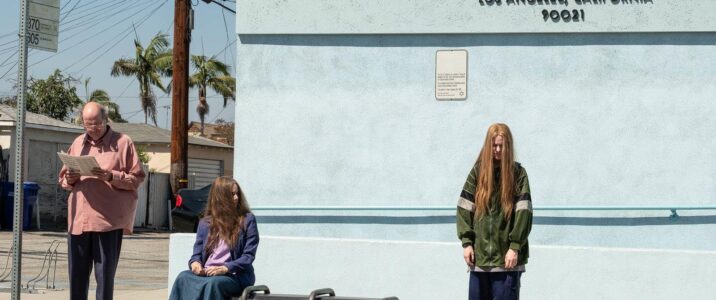As LFF continues, I think to myself that I can get the hang of this whole streaming business. But there’s still something off-putting about watching a slate of films in isolation, especially when it’s meant to be enjoyed with an audience. I certainly felt that way watching some of the comedies featured this year, acutely aware of how differently the jokes may land in a crowded cinema. But all three of the films I watched, whether they were funny or dramatic, contained a groundswell of loneliness that sometimes surged to the surface of often melancholic tales.
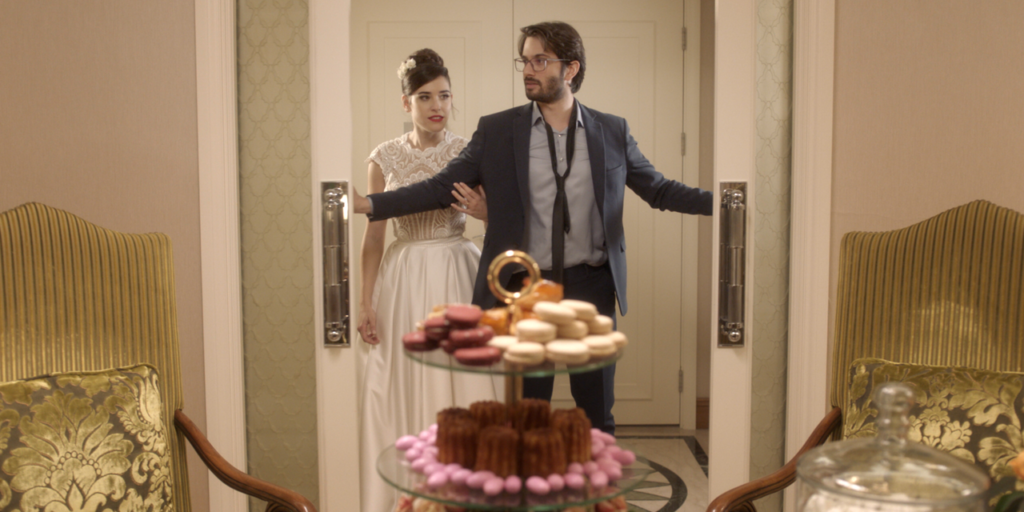
After a day of mostly somber fare, a romantic comedy sounded, at least in theory, like a perfectly buoyant reprieve. So it brings me little pleasure in saying that Honeymood (2.5/5) barely qualifies as either funny or romantic. While the feature debut from Israeli filmmaker Talya Lavie has tremendous potential, it fails to live up to the very best films of its ilk in reaching heights of absurdist euphoria.
The film operates in the feverish, nocturnal vein of dark comic classics like After Hours as we follow newlyweds Eleanor (Avigail Harari and Noam (Ran Danker) over their first twelve hours together as husband and wife. They’ve been gifted the presidential suite at a glamorous hotel by Noam’s domineering parents, and they’ve hardly settled among the fastidious array of bonbons that they begin arguing over a mysterious envelope gifted to Noam by his ex, Renana (Yael Folman). Despite his vehement resistance, Noam is unable to dissuade Eleanor from undertaking a quixotic odyssey to return the gift, coursing through the concrete jungle of Jerusalem at night.
The journey gradually reveals more of the neurotic dynamic between Eleanor and Noam, and the film’s shades of whimsy extend to a pair of identical twin sisters and a dance number with several bodyguards outside of the Prime Minister’s compound. What these encounters reveal is a pair who are caught in the throes of their own personal insecurities. Eleanor’s own tendencies toward dramatics speaks to a slyly satirical view of culturally sanctioned arrested development, one where growing older is misconstrued in patriotic terms. In a scene where her students exploit her seniority to get into a party, Eleanor bemoans their status as the “future of our country”, much to their utter indifference. This link to a patriotic identity is reinforced by Noam’s past service as a bodyguard, a fact which does nothing to dispel the fact that he’s never actually been in any kind of physical altercation.
To the credit of Lavie’s script, the often acerbic humor doesn’t completely render her protagonists fools to be ridiculed by the audience. Indeed, there is a promise of subversion in the film’s climax where most of the characters reunite at the hotel for a cathartic expression of dissatisfaction with fitting into prescribed, normative social roles. It’s a shame, then, that Honeymood can’t stick the landing and retreats into the conventional comforts of belabored gags that only occasionally elicit a chuckle. The dichotomy between “Night People” and “Ordinary People” beckons to a poignant promise Lavie never fulfills. It’s telling, then, that the final shot of a character’s befuddled shrug, perfectly summarizes my feelings for Honeymood.

By contrast, Kajillionaire (3.5/5) is a more satisfying study of social outcasts. The latest film from Miranda July playfully mixes heist movie and romantic comedy conventions to gently probe one character’s loneliness within a fabulist framework. This dichotomy between the quirky and the bittersweet will be familiar to longtime fans of the auteur behind Me and You and Everyone We Know and The Future. Yet if July doesn’t necessarily reinvent her stylistic signature, Kajillionaire nevertheless provides her with a cast game enough to carefully toe the fine line between the offbeat and recognizable.
We certainly can’t help but feel a little perplexed meeting the film’s primary trio, a family of thieves whose ambitions lie in stealing contents from other people’s mail at the post office. The parents, Robert and Theresa Dyne (Richard Jenkins and Debra Winger) have trained their adult daughter Old Dolio (named after a homeless man who refused to share his lottery winnings with the Dynes) to help them in their amateur heists. She’s played by Evan Rachel Wood, her pale complexion obscured by a curtain of blonde hair that stretches down to her thighs. Wood’s performance is contingent upon her slim physicality as Old Dolio’s oversized track suit serves as a buttress against intimacy. When she inadvertently winds up in a parenting skills course, footage of a baby crawling on its mother’s belly sends the young woman into a state of utter bewilderment.
When the family is told by their landlord, Stovik (Mark Ivanir), to pay their overdue rent, they hatch a convoluted scheme to collect insurance money by deliberately losing their baggage on a round-trip flight from LA to New York. On the return flight, Robert and Theresa strike up a conversation with Melanie (Gina Rodriguez), a sales rep who specializes in bifocals for senior citizens. Melanie’s shrewdness makes her a useful addition to the gang, and she proposes a plan to collect money from several of her geriatric clients. July’s script doesn’t lean too heavily in establishing outlandish or suspenseful set pieces. Instead, she fixates on moments where Old Dolio and Melanie engage in coded, highly charged interactions. The removal of a chipped, false fingernail with tentative, yet gentle apprehension is the most intimately sensual moment in the film, and it leaves us as woozily disoriented as it does the two heroines.
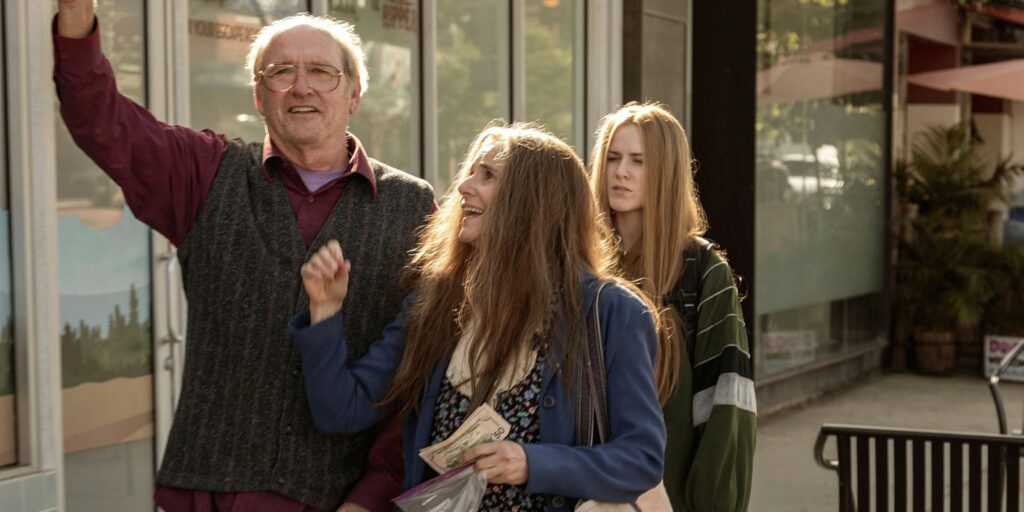
This prevalence of accessories in Kajillionaire fuels the film’s critical vision of a consumer culture that has curdled into self-parody. “I feel like a senator!”, Robert beams after their first score with one of Melanie’s clients, staring at his reflection in the storefront window where he and Theresa will, unwisely, purchase a hot tub. While Old Dolio’s parents often decry stereotypical visions of familial affluence, their own narcissism implicates them within that very model of normalcy. Yet their concept of an equitable life extends only as far as splitting the take from any job three-ways to compensate for their inadequacy at expressing affection to their daughter. The simulacrum of a happy, healthy family finds its most oddly moving apex in an interlude with an old man named Abe. He requests the quartet pretend to be a family in his living room and kitchen, exchanging banal pleasantries (“How was your day?”) as he lays in his bed, slowly dying. Only Old Olio speaks directly with him, her best attempt at consoling him during his final moments is by reassuring him that death is “no big deal.”
Fear of death permeates the lives of the Dyne family, particularly every time an earthquake sends tremors throughout the city. Their terror of a forthcoming “Big One” annihilating all human life belies a greater uncertainty in personal change. When the cataclysmic event finally arrives, Wood shifts through several emotional modulations of fear, rage, and rapturous awe, most of which are filmed in a long take following her stumbling into a gas station and attempting to buy their entire stock of junk food. Cyclical patterns, either of wanton consumption or familial dysfunction, insidiously threaten Old Dolio’s chances of growing out of her ossified sorrow.
That opportunity for escape is offered by Melanie, whose charismatic feistiness and warm sensitivity are ably handled by Rodriguez. Yet despite her strong performance, Rodriguez can’t entirely surpass the schematic function of a Manic Pixie Dream Girl July’s script demands of her, the only aspect of her personal life we see being occasional phone calls with her mother. July’s predilection toward pat, clever scenarios occasionally push her story to forced, twee lengths, including a denouement which feels overly neat in its symbolic callbacks. Yet the whimsical flourishes of Kajillionaire, like the pink bubbles overflowing from Stovik’s soap factory into the office space where the Dyne family lives, are best when they convey the messiness often inherent in expressing love. After all, Melanie puts it quite nicely, if simply, that “most happiness comes from, like, dumb stuff.”
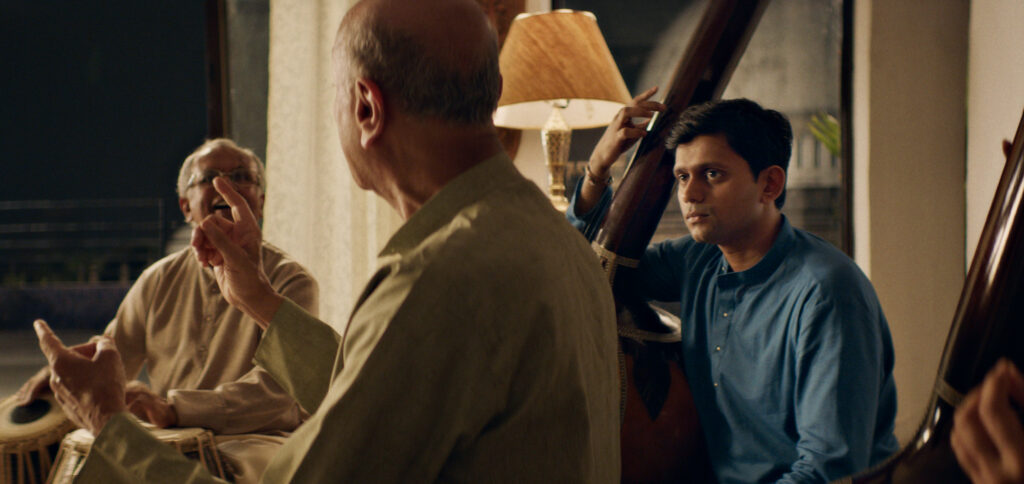
If happiness and frivolity go hand in hand, where does that leave greatness? That core query has provided many a film, both good and bad, an enduring trope ripe for conflict. Yet Chaitanya Tamane’s The Disciple (4.5/5) completely dispenses with clichés to interrogate music as a constituent of both artistic and cultural identity. Formally as well as narratively, Tamane’s sophomore feature emanates a calm command for the willing viewer to plunge into its hypnotic structure, lulling them into a ruminative state which plumbs disarmingly emotional depths.
The beginning is simple enough as we are introduced to Sharad Nerulkar (Aditya Modak) performing onstage with his teacher (Arun Dravid). Sharad’s appearance is marked by what will only be the first of several shots which track inwards to him seated, signifying different stages of his development as a classical musician. Repetition is a key formal trait of the film, nowhere more clear than when Sharad rides his motorbike while listening to rare audio recordings he’s digitized of Maai, the guru who trained Sharad’s father in performing the various iterations of the raag. “Through this music we are shown the path of the Divine”, she intones while Sharhad’s bike floats through the streets of Mumbai. This inquisitive pursuit of transcendence through the quotidian finds its visual complement in DoP Michal Sobocinski’s immaculately composed, deep-focus wide shots.
This interplay between subjective and objective reality is emblematic of a greater interest in Sharhad’s personal motivation. Spare flashbacks to his youth subtly engage with the reliability of memory as Sharhad recalls key moments with his father either training him or taking him to see classical performances. One conversation between the father and two strangers on a train completely elides any visual indication of the sleeping boy whose body rests just out of frame until his father wakes him and orders him to list several ragas for the strangers’ enjoyment. Sharhad’s impatience for acquiring the same mythic stature of his father, as well as his aging Guruji, interiorize a greater conflict between spiritual equanimity and cultural conformity. Even after achieving relative success, Sharhad is overcome with blistering resentment toward withering put-downs on YouTube videos of his performances.
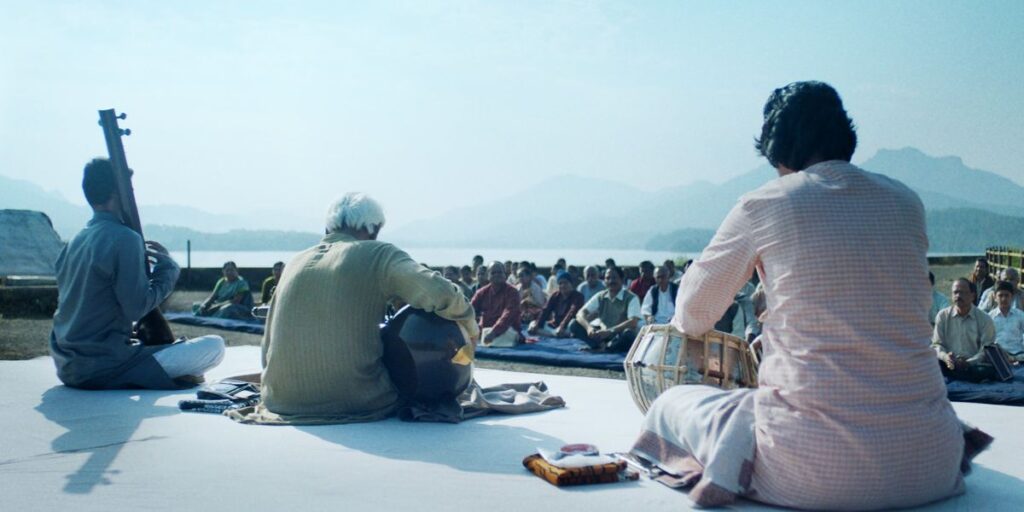
The Disciple forgoes any simplistic rags-to-riches story beats, lingering instead on the process of performance. By emphasizing the mechanics of the human body in supplication toward a higher purpose, Tamane contrapuntally casts markers of late-stage capitalism in cold, practically alien simulations of motion. Women beckoning to motorists in video billboards advertising perfume contrast with the performance sequences which render bodies in stately arrangements along separate planes within the image. The camera glides through these intimate settings, never circling around the performers save for one key, quietly rapturous moment I dare not spoil. The film’s wary regard for classical music’s commodification in popular culture is most explicitly voiced through broadcast footage of a contestant on Fame India attaining the widespread adoration Sharhad himself yearns for. Initially suffused with dry wit, the recurrence of this subplot is the most atypically didactic strain in Tamhane’s otherwise precise, sparse script.
Arguably the greatest challenge for viewers coming to the film is in Sharhad’s myopic ambition, a trait which makes him at times an insensitive protagonist. Yet the film never loses sympathy for Sharhad’s own growth, particularly as he’s confronted by the ugly aspects of those he deifies. The world the film mourns never fully existed, certainly not one devoid of the classist and racist connotations embedded in the culture of classical music. It is by honestly assessing this complex legacy that Sharhad is able to cultivate his truest sense of self. Through the rediscovery (and, ultimately, reclamation) of the multivalent significance of art, the film delicately dissects it’s function in the formation of a personal, political, and spiritual history. Without insisting upon itself, The Disciple culminates as an ephemeral paean to the limits of ambition and the humility upon realizing the distinction between who we were and who we are now. It is a soothing, wise work of originality, and one of the best films of the year.
Tomorrow:
A wry, tragi-comic tale of the immigrant experience in Scotland, a diptych of Nigerian stories, and a genuine show-stopper from David Byrne and Spike Lee.
